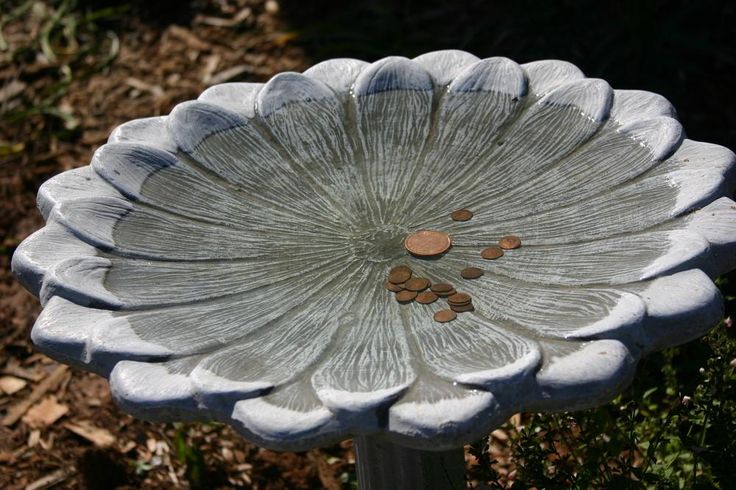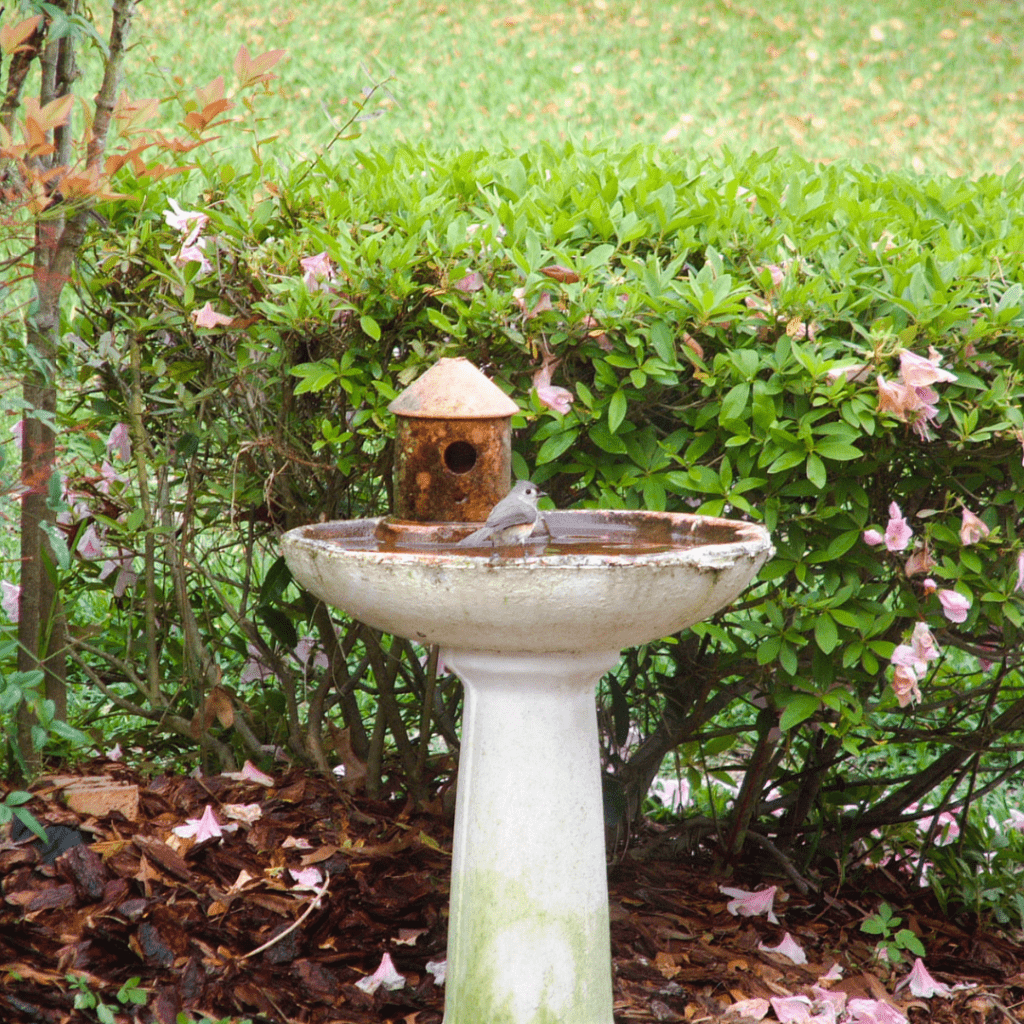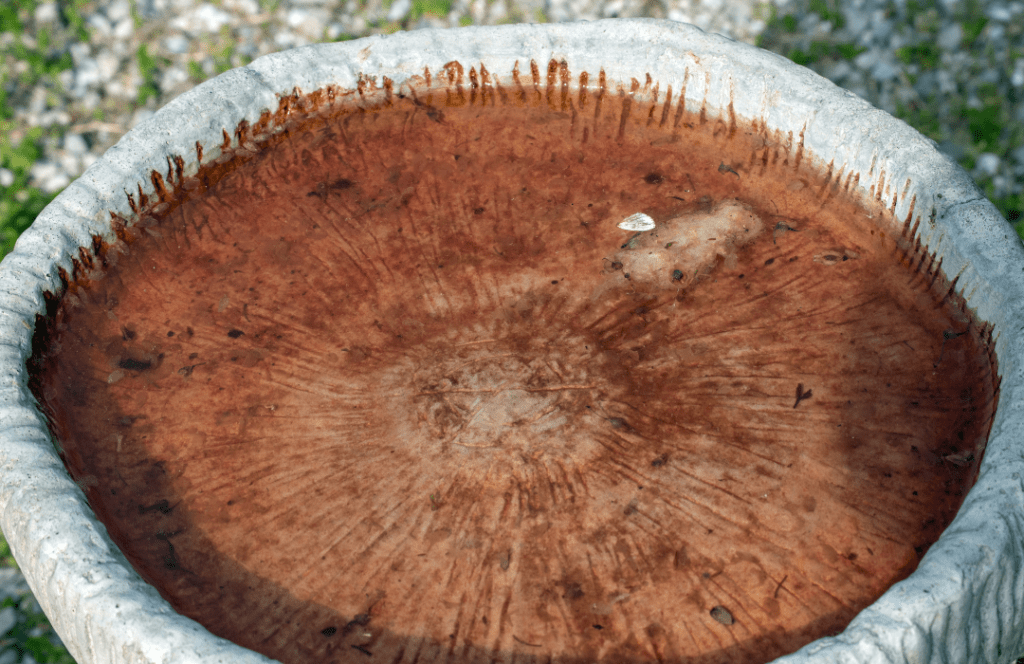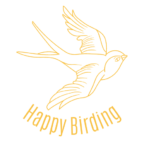Bird baths are an essential addition to any garden, providing a source of clean water for birds to drink and bathe in. Birds rely heavily on access to fresh water throughout the year, especially during hot and dry weather conditions. However, stagnant or algae-filled bird baths can do more harm than good by spreading disease and discouraging birds from using them.

Copper pennies can prevent algae buildup in bird baths, keeping the water clean and safe for birds to enjoy.
To keep your feathered friends happy and healthy, it’s important to maintain a clean bird bath free of algae buildup. Copper pennies can help with this task by releasing ions that prevent the growth of algae in the water. This simple solution not only keeps the bath looking pristine but also provides a safe haven for birds to enjoy their daily activities without worry or discomfort caused by dirty water.
Copper Pennies In Bird Baths
Copper pennies in bird baths are an easy and effective way to keep your backyard oasis clean and healthy for your feathered friends. Copper has biostatic properties that prevent the growth of algae and bacteria, helping maintain a fresh bath environment. By simply adding a few copper pennies to your bird bath, you can provide a safe space for birds to drink and bathe without worrying about harmful microorganisms.
Algae buildup is not only unsightly but also poses health risks to birds as it can produce toxins harmful to their delicate systems. Copper ions released from the pennies interfere with the metabolic processes of algae cells, preventing them from multiplying or thriving in water bodies like bird baths. Regularly replacing old copper coins with new ones can ensure that your bird bath stays clean and free of contaminants all year round.
Why Do People Put Copper Pennies In Bird Baths?
Copper pennies prevent algae growth in bird baths, making them a popular addition to any backyard oasis for our feathered friends. Algae can be harmful to birds, so copper pennies help keep them healthy by creating an environment that is biostatic and inhibits the growth of bacteria and other harmful microorganisms. Copper also has natural antibacterial properties that can benefit birds by preventing the spread of disease.
Here are some reasons why people put copper pennies in bird baths:
- Copper has antimicrobial properties that help kill bacteria.
- The metal helps control algae growth by disrupting its photosynthesis process.
- Bird bath water with copper ions is safe for birds but not attractive to insects like mosquitoes.
By adding just a few copper pennies to your birdbath, you’ll create an environment that’s both safe and inviting for even the most finicky feathered friends!
Which Penny To Put In Bird Bath?
Want to provide your feathered friends with an algae-free oasis? Use pre-1982 pennies in your bird bath! These coins are made mostly of copper and have a higher concentration of the metal, which acts as a biostatic agent. Avoid using newer pennies that contain less copper and more zinc, as they won’t be as effective at keeping bacteria growth at bay. Be sure to clean the pennies before putting them in the bath to remove any dirt or debris that could attract unwanted microorganisms. Your birds will thank you for their fresh, clean bathing spot!

Do Birds Like Copper Pennies In Bird Baths?
Benefits of using copper pennies in bird baths:
Copper is known to have antimicrobial properties that can help prevent the growth of algae and bacteria in bird baths. By adding a few copper pennies to your birdbath, you create an environment that is both clean and safe for birds. Copper also oxidizes over time, which helps keep the water clear.
Birds' natural attraction to shiny objects:
Many birds are naturally attracted to shiny objects like coins or metal decorations because they resemble the reflective surfaces found near bodies of water where they often forage for food. Placing copper pennies in your bird bath can pique their curiosity and encourage them to investigate further.
How to encourage birds to use a new bird bath:
If you want birds to use a new birdbath, it’s important first not just add water but also make sure there’s plenty of cover nearby such as trees or bushes so that they’ll feel more secure while bathing or drinking from it. Placing rocks inside the bowl can provide additional perches as well as give them something solid on which they can stand while cleaning themselves off after flying around all day long!
Why Do Copper Pennies Work?
Copper pennies work in bird baths because they release small amounts of copper ions, which prevent the growth of algae and other microorganisms. The ions act as a natural algaecide, keeping the water clear and clean for birds to drink and bathe in.
This method is cost-effective, eco-friendly, and easy to implement. Simply toss a few copper coins into your bird bath or fountain and watch as nature takes care of the rest. Plus, it’s a great way to repurpose old pennies while providing your feathered friends with a healthy oasis.
Do Copper Pennies Keep Bird Baths Clean?
The Science Behind Copper’s Algae-Fighting Abilities: Copper ions are known for their remarkable ability to prevent the growth of algae and other microorganisms. When copper is exposed to water, it releases positively charged ions that are toxic to these organisms. These ions disrupt their cellular processes, ultimately killing them off and preventing further growth.
How to Use Copper Pennies in Your Bird Bath: Tips and Tricks: Using copper pennies in your bird bath can help keep it clean by releasing small amounts of copper into the water over time. To use them effectively, simply drop a few uncleaned pennies into the basin, making sure they don’t cover too much surface area or block any drainage holes. Change out the pennies every few months as needed.
Other Benefits of Using Copper in a Birdbath: In addition to its algae-fighting abilities, copper has some other potential benefits when used in bird baths. For one thing, it may discourage mosquitoes from laying eggs in stagnant water (although more research is needed on this). Additionally, because birds have sharp eyesight and good color vision, they may be attracted to the shiny appearance of copper materials – which could make your birdbath an even more popular destination for feathered friends!
How Do You Get Green Algae Out Of A Bird Bath?
Identifying the Different Types of Algae in Your Birdbath:
Algae can be a common problem for birdbaths, especially during warmer months. There are different types of algae that can grow in your bird bath, including green algae and blue-green algae. Green algae is more common and appears as slimy green patches on the surface of the water. Blue-green algae is less common but can be dangerous to birds if ingested.

Natural Methods for Removing Algae from Your Birdbath:
One effective method for removing green algae from your bird bath involves using copper pennies. The copper ions released by the pennies help to inhibit the growth of any new or existing algaes in your bird bath without harming birds or other animals that drink from it. Another option is to use vinegar or bleach diluted with water to scrub away any visible growth.
Preventing Future Growth of Algae in Your Birdbath:
To prevent future growth of algae in your birdbath, you should regularly clean it and refill it with fresh water at least once a week. You may also want to consider placing your birdbath somewhere with partial shade rather than direct sunlight since sunlight promotes the growth of all algaes, not just those that are harmful to birds like blue-green algae.
Are Copper Pennies Safe To Use in Bird Baths?
Copper pennies are safe to use in bird baths. They have been found to prevent the growth of algae and other harmful microorganisms, creating a clean environment for birds to enjoy. Copper is also known to have antibacterial properties that can help keep the water fresh and pure.
While copper pennies may be safe for birds, it’s important to note that they may not be as effective as other methods for preventing algae growth. Additionally, using too many copper pennies or leaving them in the bird bath for extended periods could lead to high levels of copper in the water, which could potentially harm aquatic life. As with any method used in a bird bath, it’s essential to monitor its effectiveness and safety over time.
Can You Use A Copper Bird Bath?
Copper bird baths are an excellent choice for nature enthusiasts who want to provide their feathered friends with a safe and clean drinking spot. Here are some reasons why copper bird baths can be a valuable addition to your garden:
- Copper has natural antibacterial properties that can keep the bird bath clean.
- Placing copper pennies at the bottom of the bird bath helps prevent algae growth.
- Copper fountains are also an option for those who want to add aesthetic appeal to their garden while providing a safe drinking spot for birds.
Investing in a copper bird bath is not only visually appealing but will also ensure that your feathered friends have access to fresh, clean water all year round. Don’t forget to add some shiny pennies at the bottom of your birdbath for extra protection against pesky algae!
Is A Copper Birdbath Harmful To Birds?
Copper’s Effect on Birds’ Health is a topic of concern for many owners of copper birdbaths. Copper poisoning in birds can lead to a wide range of health complications and even death. While copper has some antimicrobial properties that make it useful in bird baths, the dangers associated with its use cannot be ignored.
Potential Dangers of Copper Poisoning in Birds include diarrhea, vomiting, lethargy, and seizures. Signs Of Copper Toxicity In Birds may also include yellowing or discoloration around the eyes or feathers. These symptoms can quickly progress into more severe complications if not treated promptly by a veterinarian.
If you’re considering using copper pennies in your birdbath to keep algae at bay, it’s crucial to be aware of the potential dangers they pose to your feathered friends’ health. Consider alternative methods such as regular cleaning or adding beneficial bacteria instead that are safer for all parties involved while still keeping your bird bath clean and inviting for local wildlife!
Other Bird Bath Cleaning Methods
If you’re looking for alternative bird bath cleaning methods, there are a few options to consider. One method is using white vinegar and water solution to scrub the basin thoroughly with a brush. Another technique involves placing small pebbles or rocks at the bottom of the basin to create turbulence in the water, preventing algae growth.
Additionally, some bird enthusiasts swear by adding copper pennies into their bird baths to prevent algae buildup. The copper ions released from these coins have an anti-algae effect that can keep your feathered friends’ oasis clean and sparkling without harming them. Just be sure not to use any modern-day pennies that contain zinc, as it can be toxic for birds if ingested.
What Can You Put In A Bird Bath To Keep It Clean?
Are you tired of constantly cleaning your bird bath due to algae buildup? Fortunately, there are a few simple solutions to keep your feathered friends’ oasis clean and healthy. Here are some tips on what you can put in a bird bath to keep it clean:
- Vinegar: A natural cleaner that is safe for birds. Mix one part vinegar with nine parts water and scrub the bird bath with this solution.
- Bleach solution: For tough stains or disinfection purposes, mix one part bleach with nine parts water. However, make sure to rinse the bird bath thoroughly before refilling it with fresh water.
- Commercial cleaners: You can also opt for commercial bird bath cleaners available in stores.
Remember not to use any abrasive materials while cleaning the bird bath as they may scratch its surface and harm birds. Enjoy watching your feathered friends frolic around in their algae-free oasis!
How Do I Keep My Fountain Water Clean For Birds?
Regular cleaning and replacing of water is essential in keeping your fountain clean for birds. Stagnant water can become a breeding ground for harmful bacteria, which can be detrimental to the health of our feathered friends. Also, adding algae inhibitors and clarifiers to your fountain can help reduce the growth of algae and keep the water clear.
Installing a filtration system in your fountain could also be an excellent option in maintaining clean water for birds. Filtration systems work by removing debris and contaminants from the water, ensuring that it stays fresh and healthy over time. A well-maintained bird bath with crystal clear water will undoubtedly attract more feathered visitors than one filled with murky or dirty liquid!
Can You Add Olive Oil In Bird Bath?
No, it is not recommended to add olive oil in bird baths. Olive oil creates a film over the water which can harm birds’ feathers and lead to health problems. However, vegetable glycerin can be used instead as it helps keep the water from evaporating too quickly without harming our feathered friends.
If you want to maintain a healthy and clean bird bath, here are some additional tips:
- Use copper pennies or copper wire mesh at the bottom of your bird bath to prevent algae growth.
- Change water daily or on alternate days depending on how often birds use it.
- Scrub the birdbath regularly with a brush and mild soap solution.
- Position your bird bath away from trees where leaves could fall into them and create dirty patches of standing water.
By following these simple steps, you can enjoy watching beautiful birds taking their morning baths while keeping them safe from potentially harmful substances.
Conclusion
And there you have it, my bird-loving buddies. Remember, maintaining clean bird baths is important for our winged pals’ health and happiness. Whether you try copper pennies or other methods, the goal is the same: a clean, refreshing spot for birds to frolic and bathe. And isn’t that a chirpy thought?
Stay tuned for more fascinating birding tips and tricks. Until then, happy birding!

James has always been an avid outdoorsman. Since a kid, he kept a journal of all the different birds and species he saw. Now he wants to share his passion with other birders with Happy Birding!
